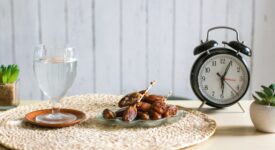These are 5 nutrient-rich food items that are suitable for fasting throughout Ramadan if you’re worried about your diet during that time.
For Muslims worldwide, Ramadan is the most revered month. Muslims avoid eating, drinking, and performing any other physical activity during this holy month. Fasting can be difficult, especially in the first few days of Ramadan. In the Middle East, it normally lasts between 10 and 14 hours. Consuming satisfying, healthful, and nutritious foods during non-fasting hours will help your body adjust to the fasting hours, making fasting more manageable and sustainable.

Even though fasting is practised for religious reasons, it has many other known advantages for your health. In addition to enhancing self-control and self-discipline, it also lowers blood pressure, lowers the risk of metabolic disorders, and improves mental skills.
These are some items that you can eat during non-fasting hours (particularly Iftar and Suhoor) to nourish your body and better get it ready for long hours of hunger and thirst.
1. Coconut Water

The significance of drinking plenty of water throughout your non-fasting hours cannot be overstated. Drinking coconut water can help you take this a step further because it has numerous health advantages in addition to acting as a general cooler. Coconut water is filled with electrolytes, which can assist your body in replacing lost minerals. It has a very high potassium content and makes you feel hydrated. Coconut water is a fantastic choice for other fruit juices and carbonated drinks that are heavy in calories and sugar and can help you quench your thirst.
Fasting continuously for several hours is not an easy task, whether you’re doing intermittent fasting or following Ramadan. Better eating habits and greater discipline can ease the burden on your body, though. Although there are only a few hours in the day when you do get to eat, be careful not to cover those with unnecessary processed food or junk food. Consume a lot of vegetables, lean proteins, and healthy carbs, and drink a lot of water!
2. Whole Grains

Healthy grains, like brown rice, quinoa, and whole wheat, are complex carbs that release energy gradually, keeping you satisfied and energised for extended periods. You can control your hunger levels for the majority of the day by eating a well-balanced meal during Suhoor that consists of brown rice or quinoa with veggies and some protein. They are also high in fibre, which supports good blood sugar regulation and digestion.
3. Dates

During Ramadan, especially at Iftar, the meal that breaks the fast, dates are a common food item consumed. Dates are very energizing foods. They are not only a great source of natural carbohydrates, but they also include many important vitamins and minerals, such as potassium, magnesium, and iron, that are crucial for preserving health throughout the fasting period. Dates, especially those of the “Medjool” variety, aid to refill your glycogen stores and boost your energy.
4. Lean Protein

If you want to avoid feeling that gnawing feeling of hunger, you must consume lean proteins. Lean proteins, such as those found in fish, Greek yoghurt, chicken, cottage cheese, beans, and other foods, should be a part of your diet during Ramadan. To function throughout the day without feeling worn out or tense, proteins are necessary for the development, maintenance, and repair of tissues as well as for the growth and repair of muscles.
5. Fruits and Vegetable

A balanced intake of fruits and vegetables is a necessity for any diet. Your body might not get the vital sources of nutrients and proteins it needs during Ramadan due to the extended hours of fasting. Including a variety of fruits and vegetables in your pre and post-fast meals is one approach to make sure that your body doesn’t suffer. The vitamins A, C, and K, as well as folate, are all found in abundance in fruits and vegetables.
If you’re fasting during Ramadan, be sure to eat plenty of water-rich produce like cucumbers and watermelons. Stock up on leafy greens, which help to control blood pressure and provide your body with vitamins and folic acid. Examples of these foods are spinach, Swiss chard, lettuce, kale, and others. Almonds, cashews, and other dry fruits and nuts are high in protein and support blood sugar regulation.







